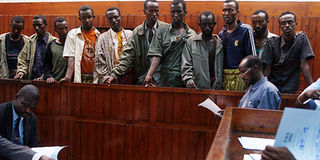Leaders question trial of piracy suspects in Kenyan courts

Suspected Somali pirates stand in the dock inside a courtroom in the Kenyan coastal town of Mombasa, April 23, 2009. The eleven suspected pirates faced charges of hijacking a Safmarine Asia ship with weapons. PHOTO/ REUTERS
What you need to know:
- Groups demand that government make contents public of MoU with America
The trial of suspected Somali pirates in Mombasa is causing disquiet among Muslim groups in the country who are accusing foreign governments of attempting to “turn the Coast into another Guantanamo Bay”.
This is in reference to the detention camp for terror suspects on US land in Cuba that President Barack Obama has ordered closed.
The groups say the suspects are a potential security threat to Kenya and that trying them here may create unnecessary tension between the country and its Horn of Africa neighbours.
The trials are linked to an undisclosed Memorandum of Understanding signed between Kenya and the United States on January 16, 2009 under which Kenya agreed to try suspected pirates captured by US forces.
Kenya signed a similar MoU with the European Union on March 6, 2009 and another one with Canada and is expected to enter a similar deal with China.
The US, France, Australia, Japan, South Korea, Italy, Ukraine, Canada and India are among countries that have deployed ships to patrol the waters off the Somali coast to repel pirates.
Council of Imams and Preachers organising secretary Sheikh Mohammed Khalifa asked the government why it was holding “people who had not wronged us in any way”.
The US, Sheikh Khalifa said, was using Mombasa as a dumping ground for piracy suspects.
Fear has been expressed in some quarters that relatives of suspects, piracy financiers and gang members could violently avenge the incarceration of their kin and business associates in Kenya.
UN reports indicate that an extensive network of Somalis in the diaspora, mainly in Canada and Kenya, is bank-rolling piracy, which has become a lucrative business.
Kenya is host to thousands of Somali refugees who fled their country after the 1991 ouster of dictator Siad Barre and subsequent fighting involving militias, warlords and clans.
The Muslim leaders spoke a day before Al Shaabab, the Somali militant group, threatened to invade Kenya if Nairobi does not reduce military patrols on its border with Somalia.
The threat comes amid media reports that dozens of Al-Qaeda fighters fleeing intensified attacks on their bases in Pakistan by US and Pakistani forces are moving to Somalia.
The militant groups battling for the control of Mogadishu resent Kenya’s support for the Transitional Federal Government, which they consider a puppet of Western powers.
Stands to gain
Questions are also being raised over what specific commitments Kenya has made to Washington in the MoU and what Kenya stands to gain.
Though not opposed to the cooperation, ODM nominated MP Sheikh Mohammed Dor wondered why suspects should not be taken to the countries whose vessels they allegedly attacked.
“What have we been promised by the US?” he asked. “Why should we burden ourselves with unnecessary cases? We don’t have enough magistrates. We can’t even clear the backlog of cases in our courts, and the prisons are congested.”
But Sheikh Dor said he did not perceive the problem as a Muslim issue.
“The pirates are just thieves like any other,” he said.
The Kenya National Commission on Human Rights has asked the government to make its MoU with the US public to help Kenyans understand what they stood to gain from the cooperation.
KNCHR vice-chairman Hassan Omar Hassan said though the government could mean well, the deal was a potential security threat to Kenya because the number of pirates was growing.
He asked the government to stop receiving the pirates and “re-evaluate the commitment to ensure it does not jeopardise national security”.
He attributed the move to what he called Kenya’s “blind policy of foreign engagement”.
“Our foreign commitments are often driven by unsubstantial issues,” he added.
Last week, the US Navy handed over 17 suspected Somali pirates to Kenya for prosecution. This brings to 111 the number of suspects held in Kenya on piracy-related issues.
Kenya is seen as the most attractive country in the region to partner with the western powers because it is a signatory to agreements such as the SUA convention for the suppression of unlawful acts of violence and protocols on combating piracy in the high seas.
The move is packaged as part of Kenya’s obligation under international law.
Kenya has a functional judiciary whose courts have the jurisdiction and capacity to try piracy suspects. In addition, it is seen as the anchor state in the region and a strategic ally of the US in the battle against terrorism.
In addition to the MoU, Foreign Affairs minister Moses Wetang’ula says it is also in Kenya’s interest, both as Somalia’s neighbour and a member of Igad, to fight piracy because many of the vessels tageted have been heading to the Port of Mombasa.
Jurisdiction
A new merchant shipping Bill, which confers on local courts jurisdiction over non-nationals for hijacking and robbery committed on the high seas, is awaiting presidential assent.
It is consistent with the common law norm that crimes defined by international law require domestic law to try or punish them.
But law scholar James Gathii argues that it is only the High Court of Kenya, not the subordinate courts, that has such jurisdiction.




